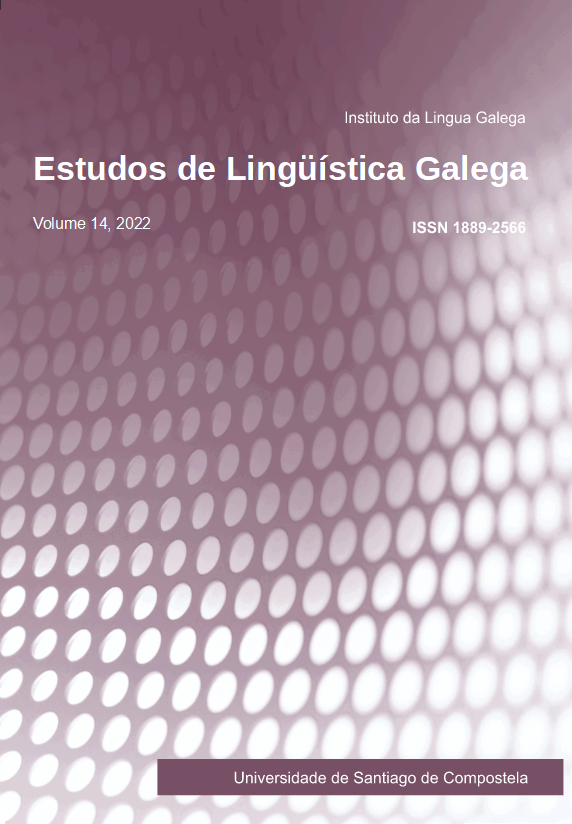Direct Speech in the context of discussion on code-switching
Main Article Content
Abstract
In this article, we analyse the use of direct speech in Galician in conversations where Spanish is the main language. The empirical base of our research consists of interviews from the ESLORA corpus. We classify these interviews into three different groups: 1) conversations with direct speech in Spanish; 2) conversations with direct speech in Spanish and Galician; and 3) conversations without any kind of direct speech. Furthermore, we analyse the sociolinguistic function of cases gathered from group number 2. Following Celso Álvarez Cáccamo (1987, 1998, 2000), we utilise code-switching and language alternation as key concepts in our research. Code-switching involves a process of recontextualisation of the communication code, which results in a change to the spoken language, from language A to language B. Language alternation does not involve recontextualisation, which takes place in a bilingual context when a speaker introduces words, expressions, or other features from language A in their speech in language B, without any kind recontextualisation of the communication code. We argue that direct speech in Galician, in conversations where Spanish is the main language, is, in fact, a form of code-switching. By using direct speech in Galician, speakers negotiate and recontextualise the communication code. This process is determined by the social structures of the linguistic context. In the analysis of the corpus, we use a quantitative approach. In the interpretation of the linguistic motivations of the speakers, we use a qualitative approach.
Keywords:
Article Details
References
Álvarez Cáccamo, Celso. 1987. Fala, bilingüismo, poder social. Agália 10, 127-150.
Álvarez Cáccamo, Celso. 1996. The power of reflexive language(s): Code displacement in reported speech. Journal of Pragmatics 25, 33-59.
Álvarez Cáccamo, Celso. 1998. From switching code to code-switching: towards a reconceptualization of communication codes. En Peter Auer (ed.), Code-Switching in Conversation: Language, Interaction and Identity. 29-48. London & New York: Routledge.
Álvarez Cáccamo, Celso. 2000. Para um modelo do “code-switching” e a alternância de variedades como fenómenos distintos: dados do discurso galego-português/espanhol na Galiza. Estudios de sociolingüística 1(1), 111-128. https://doi.org/10.1558/sols.v1i1.111
Atanes Barciela, Lois Xacobe. 2022. El cambio de código según la teoría de la comunicación: problematización teórico-práctica a través de un caso del corpus ESLORA. Philologia Hispalensis 36(1), 27-50. https://doi.org/10.12795/PH.2022.v36.i01.02
Auer, Peter. 1985. The pragmatics of code-switching: A sequential approach. En Lesley Milroy & Pieter Muysken (eds.), One Speaker, Two Languages: Cross-Disciplinary Perspectives on Code-Switching. 115-135. Cambridge: Cambridge University Press. https://doi.org/10.1017/CBO9780511620867.006
Auer, Peter. 1998. Introduction: Bilingual Conversation revisited. En Peter Auer (ed.), Code-Switching in Conversation: Language, Interaction and Identity. 1-24. London & New York: Routledge.
Auer, Peter. 2005. A postscript: code-switching and social identity. Journal of Pragmatics 37, 403‑410. https://doi.org/10.1016/j.pragma.2004.10.010
Austin, J. L. 1961. Philosophical Papers. Oxford: Oxford University Press.
Benavent Payá, Elisa. 2015. “Decir” y discurso directo en los relatos de la conversación coloquial. València: Universitat de València. [Tese de doutoramento inédita].
Briz, Antonio. 2018. Al hilo del español hablado. Reflexiones sobre pragmática y español coloquial. Sevilla: Editorial Universidad de Sevilla. https://doi.org/10.1515/9783110362084-023
Cashman, Holly. 2005. Identities at play: language preference and group membership in bilingual talk in interaction. Journal of Pragmatics, 37, 301-305. https://doi.org/10.1016/j.pragma.2004.10.004
ESLORA: Corpus para el estudio del español oral <http://eslora.usc.es>, versión 2.1 de xuño de 2021, ISSN: 2444-1430.
Fernández, María Fernanda. 2012. Discurso directo e indirecto en el español de Mérida. Lengua y habla 16, 1-15.
Gumperz, John J. 1982. Discourse Strategies. Cambridge: Cambridge University Press.
Halliday, Michael Alexander Kirkwood. 1985. Spoken and written language. Oxford: Oxford University Press.
Haugen, E. 1956. Bilingualism in the Americas: A Bibliography and Research Guide. Alabama: University of Alabama Press/American Dialect Society.
Instituto Nacional de Estadística. 2023. Censo 2021. https://www.ine.es/dyngs/INEbase/es/operacion.htm?c=Estadistica_C&cid=1254736177092&menu=resultados&idp=1254735572981 [23/4/2023]
Maldonado, Concepción. 1991. Discurso directo y discurso indirecto. Madrid: Taurus.
Maldonado, Concepción. 1999. Discurso directo y discurso indirecto. En Ignacio Bosque & Violeta Demonte (coords.), Gramática descriptiva de la lengua española, vol. 3. 3551-3595. Madrid: Espasa.
Myers-Scotton, Carol. 1993. Social Motivation of Code-Switching. Oxford: Oxford University Press.
Myers-Scotton, Carol. 2007. Code-switching with English: Types of switching, types of communities. World Englishes, 8(3), 333-346. https://doi.org/10.1111/j.1467-971X.1989.tb00673.x.
Pavlenko, Aneta. 2005. Emotions and multilingualism. Cambridge: Cambridge University Press.
Poplack, Shana. 1980. Sometimes I'll start a sentence in Spanish Y TERMINO EN ESPAÑOL: toward a typology of code-switching. Linguistics 18, 581-618. https://doi.org/10.1515/ling.1980.18.7-8.581
Poplack, Shana. 2015. Code Switching: Linguistic. International Encyclopedia of the Social & Behavioral Sciences, 2.ª edn, volume 3, 918-925. https://doi.org/10.1016/B978-0-08-097086-8.53004-9
Repede, Doina. 2018. El uso del discurso referido en el corpus PRESEEA-Sevilla. Anuario de Letras. Lingüística y Filología 6, 187-218. https://doi.org/10.19130/iifl.adel.6.1.2018.1481
Repede, Doina. 2019. Discurso directo y discurso indirecto: estudio sociolingüístico en el corpus Encuestas de habla urbana de Sevilla. Lingüística y literatura 76, 42-64.
Rojo, Guillermo. 1981. Conductas y actitudes lingüísticas en Galicia. Revista Española de Lingüística, Año n.º 11, Fasc. 2, 269-310.
Rojo, Guillermo. 2005. El español de Galicia. En Rafael Cano (ed.), Historia de la lengua española. 1087-1101. Barcelona: Ariel.
San Martín, Abelardo & Silvana Guerrero. 2013. Una aproximación sociolingüística al empleo del discurso referido en el corpus PRESEEA de Santiago de Chile. Revista Signos 46(82), 258‑282. https://doi.org/10.4067/S0718-09342013000200005
Sondaxe. 2023. Barómetro trimestral sobre o uso do galego. La Voz de Galicia. https://www.lavozdegalicia.es/noticia/galicia/2022/03/04/span-langgl-galego-na-casa-castelan-traballospan/00031646412936387314513.htm [21/4/2023].
Vázquez Veiga, Nancy. 2003. Pero ya hablé gallego, lle dixen eu...: análisis de un caso de alternancia de códigos en una situación bilingüe. ELUA. Estudios de Lingüística, 17, 589-606. https://doi.org/10.14198/ELUA2003.17.33
Wei, Li. 2005a. Starting from the right place: introduction to the special issue on Conversational Code-Switching. Journal of Pragmatics 37, 275-279. https://doi.org/10.1016/j.pragma.2004.10.003
Wei, Li. 2005b. How can you tell? Towards a common sense explanation of conversational code-switching. Journal of Pragmatics 37, 375-389. https://doi.org/10.1016/j.pragma.2004.10.008
Williams, Ashley M. 2005. Fighting words and challenging expectations: language alternation and social roles in a family dispute. Journal of Pragmatics, 37, 317-328. https://doi.org/10.1016/j.pragma.2004.10.003







